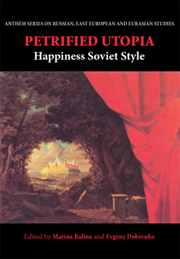Book contents
- Frontmatter
- Contents
- List of Illustrations
- Acknowledgments
- List of Contributors
- Introduction
- Petrified Utopia
- Part One Utopics
- Part Two Realities
- 5 ‘It's Grand to be An Orphan!’: Crafting Happy Citizens in Soviet Children's Literature of the 1920s
- 6 Sew Yourself Soviet: The Pleasures of Textile in the Machine Age
- 7 Happy Housewarming!: Moving into Khrushchev-Era Apartments
- 8 When We Were Happy: Remembering Soviet Holidays
- Part Three Locations
- Notes
- Index
8 - When We Were Happy: Remembering Soviet Holidays
from Part Two - Realities
Published online by Cambridge University Press: 05 March 2012
- Frontmatter
- Contents
- List of Illustrations
- Acknowledgments
- List of Contributors
- Introduction
- Petrified Utopia
- Part One Utopics
- Part Two Realities
- 5 ‘It's Grand to be An Orphan!’: Crafting Happy Citizens in Soviet Children's Literature of the 1920s
- 6 Sew Yourself Soviet: The Pleasures of Textile in the Machine Age
- 7 Happy Housewarming!: Moving into Khrushchev-Era Apartments
- 8 When We Were Happy: Remembering Soviet Holidays
- Part Three Locations
- Notes
- Index
Summary
Happiness in Russian Culture: Introductory Remarks The specificity of the concept of happiness in Soviet culture is best understood against the background of how this concept was traditionally interpreted in Russian culture. Vladimir Dahl's authoritative dictionary of the Russian language, first published in 1863, accorded two meanings to the word. The primary meaning is given as ‘success, lucky chance, something unforeseen but desirable’. The secondary meaning refers to ‘happiness’ in the sense that this word would be used in English—‘bliss and the complete fulfilment of one's wishes’. While a number of articles published recently have dealt with the place of schast'e in the Russian linguistic world-picture in terms of its ‘semantic universals’, so to speak, these seem to have left out something of fundamental importance to the understanding of the word: what one might term the ‘metaphysics of happiness’ in Russian tradition.
As has often been noted, both nexuses of meaning are derived from concepts of fortune and fate, one's ‘portion’. The basic morphological and semantic component of the word schast'e is easy to identify—chast' (a piece or portion of something, cf. uchast', ‘fate’). The prefix s' (c ъ) with reduced vowel has been identified as originally meaning ‘good, kind’, which means that the whole word can be interpreted as meaning ‘kind fate’, ‘good fortune’.
- Type
- Chapter
- Information
- Petrified UtopiaHappiness Soviet Style, pp. 161 - 186Publisher: Anthem PressPrint publication year: 2009



